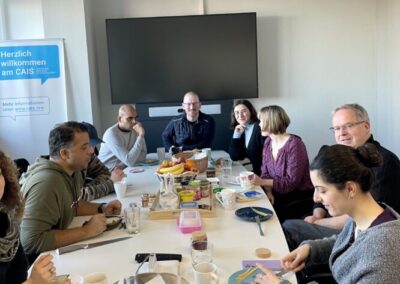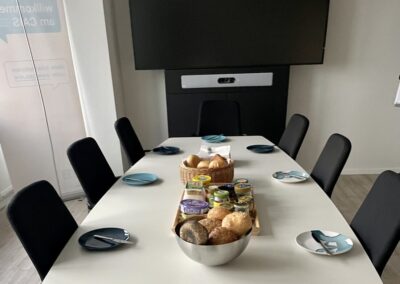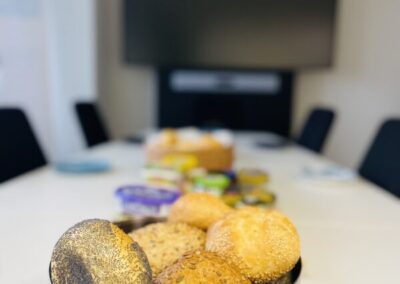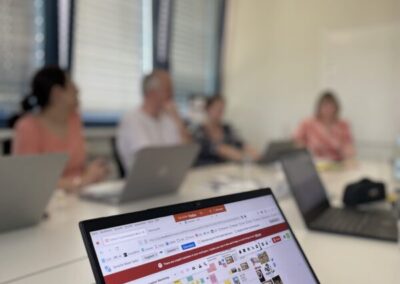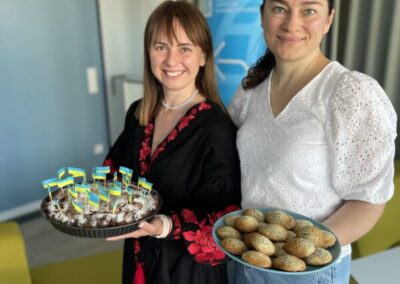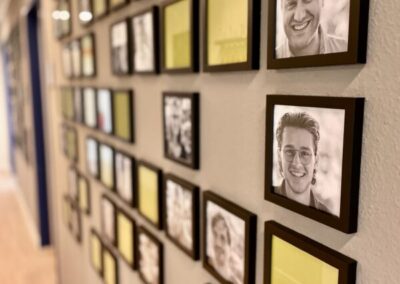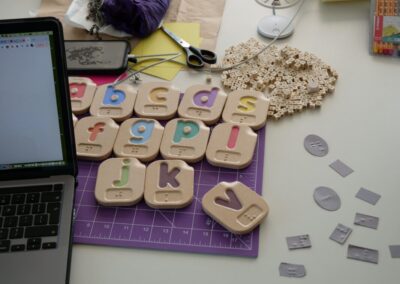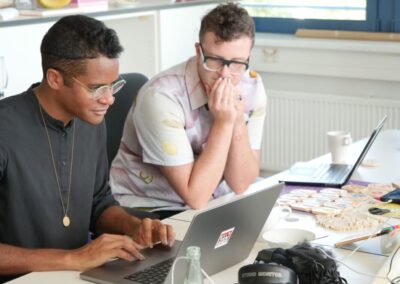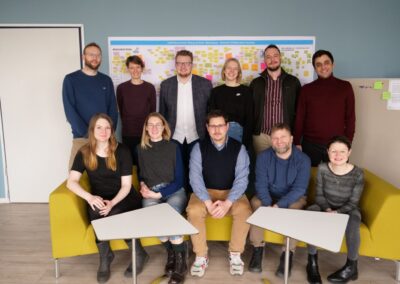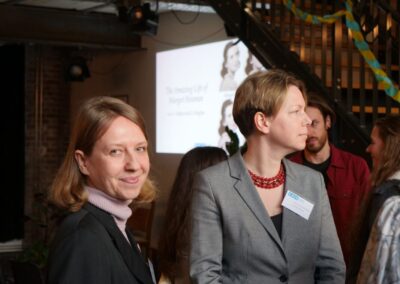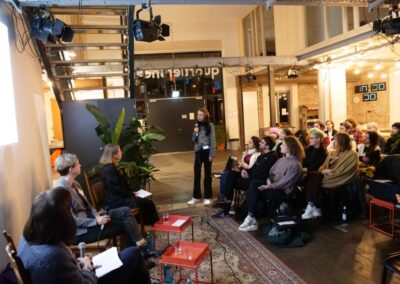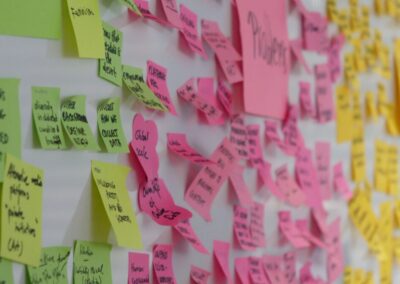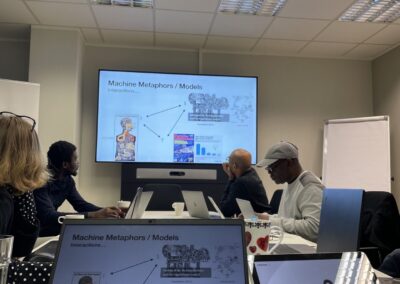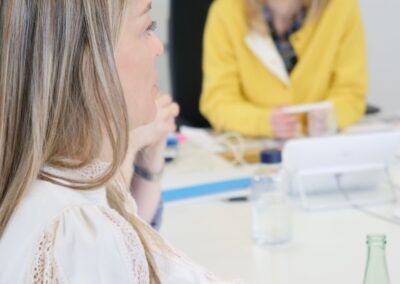Fellowships
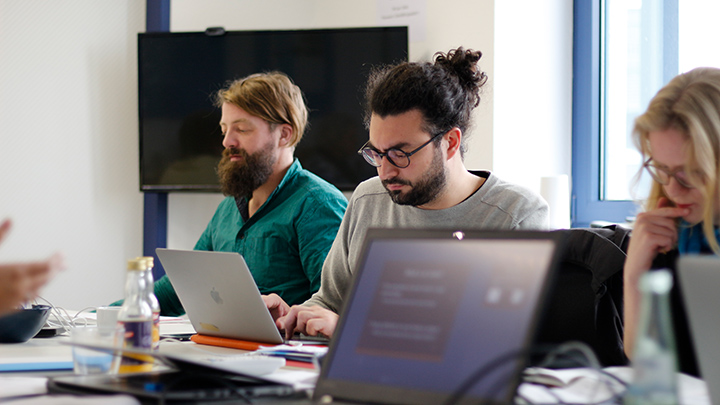
Are you researching the social, political, media-related or cultural effects of digitalization? Do you want more freedom for your project and are interested in interdisciplinary exchange? A fellowship at CAIS releases you from your regular work obligations and offers many opportunities for stimulating discussions.
Concentration and Inspiration
Fellows spend either six or three months in Bochum. During this period, CAIS finances their leave from work through compensation or grants. Individual offices and meeting rooms with modern facilities provide optimal working conditions. Fellows live rent-free in comfortable apartments located just minutes from CAIS.
Fellows are members of the vibrant interdisciplinary research community at CAIS and of an international network of alumni, working groups, and affiliates. Regular joint activities foster academic and social exchange at the Center. These activities include breakfast on Tuesdays, colloquium and dinner on Wednesdays, as well as dialogue sessions on Thursdays. Fellows can invite guests for collaboration and receive financial support for their research expenses.
Fellowships of six months usually start in October or April. Fellowships of three months can start in October, January, April, or July. Exceptions are possible after consultation.
Funding and Facilities
Fellows at CAIS should ideally be on sabbatical leave with a full salary. In that case, they will receive an additional grant of €600 per month. Alternatively, reimbursement for the costs of their salary or of a substitute can be paid within reasonable limits.
Fellows with no regular income will receive a grant of €2000 per month. Fellows with a regular income below €1400 will be given a grant that covers the difference to the full grant. Fellows with a full or compensatory grant receive an additional payment of €100 per month for each child under the age of 18. In Germany, full and compensatory grants are not subject to social security contributions and are usually tax-exempt. The Fellows are responsible for checking whether they qualify for tax exemption, especially if they reside abroad.
Fellows are provided with individual offices at CAIS and rent-free, fully furnished two-room apartments that are suitable for two adults and one infant. For fellows arriving with more than one underaged child we can also provide bigger apartments. In addition, CAIS will cover travel expenses for one return-trip to Bochum. Alternatively, CAIS can cover the costs of a daily commute if the Fellow lives close to Bochum.
Fellows can request financial support for research expenses. They can furthermore apply to invite a Visiting Fellow with whom they wish to collaborate for up to three weeks. It is also possible to invite experts from Europe for lectures or workshops. CAIS will cover the travel and accommodation expenses for these guests and pay them a daily allowance of €24.
Fellows and alumni can apply for grants of up to €5000 for innovative measures of knowledge transfer.
Further costs will not be covered by CAIS. In particular, social security contributions and insurance fees cannot be paid.
Requirements
CAIS College funds innovative projects that deal with the social opportunities and challenges of digital transformation, and develop perspectives for practice. The funding program is open to excellent scholars and practitioners, to all disciplines and areas of investigation, as well as to pure research and to projects that are more applied in orientation.
An academic degree is not required, if applicants are highly distinguished within their peer group. Master or PhD dissertations cannot be funded.
The practical implications of academic projects and the academic benefits of practical projects should be stated clearly in the applications. Concepts for the exchange between academia and other realms of society will be considered positively in the selection process.
Fellows are required to fully concentrate on their project. Furthermore, Fellows are required to be present at CAIS on the core days Tuesday to Thursday, to participate in regular joint activities and to actively contribute to the interdisciplinary dialogue.
Fellows who are in employment should be released from their work duties for the duration of their fellowship.
The common language at CAIS is English. Therefore, Fellows should have a very good command of English.
Application
Fellowships are usually awarded to applicants working on individual projects. However, joint applications for collaborative projects are also possible.
The next deadline for applications is 30 April 2024. Applicants can expect a decision by the end of November 2024.
The earliest possible starting date for new Fellowships is April 2025.
Applications can be submitted in German or English via the application form. Please familiarize yourself with the form before filling it out and consider the information provided in the individual sections.
An application consists of the following elements:
-
- Personal data and funds requested
- Outline of proposal
– Abstract (max. 300 words)
– Subject and lines of research (max. 1500 words)
– Literature review/ State of the Art (max. 700 words – optional in the case of practice-based projects)
– Theories and methods (max. 700 words – optional in the case of practice-based projects)
– Academic results (max. 300 words)
– Practical results (max. 300 words)
– Preliminary work (max. 300 words)
– Work plan (max. 300 words)
– Bibliographical references (max. 1500 words) - Request to invite a Visiting Fellow or experts for presentations or workshops (optional)
- Curriculum Vitae (PDF, max. two pages with no more than five publication references)
- One relevant publication (PDF, max. 5 MB – optional)
Please refrain from submitting multiple application forms. If you do not receive an automated confirmation e-mail, contact us.
Selection Process
Applications that meet the formal requirements will be assessed by two reviewers. The evaluation criteria are:
- Professional expertise and qualification
- Relevance and topicality
- Originality and innovative potential
- Theories and methods (optional in the case of practise-based projects)
- Academic results
- Practical results
- Interdisciplinarity
- Feasability of the work plan
Based on the reviews and under consideration of diversity criteria and capacities, the Program Committee will make its final decisions.
Further questions?
We are happy to help:
Dr. Esther Laufer

Director CAIS College
+49 234 95315029
esther.laufer@cais-research.de
Application
Application Form Fellowship
Your entries will not be saved if you close the application form before sending it.
Please therefore familiarize yourself with the structure and content of the form before filling it out. Prepare the texts and appendices according to the word limits specified. Use a citation style that does not require footnotes (e.g. Harvard or APA), and list the sources used with full details in the field “Bibliographical references”.
Please refrain from using formatting such as italics and bold, as this will not be imported. You can use blank lines to structure your texts.
You will receive an automated email-confirmation with a copy of your entries. Make sure to check your spam folder if you do not find it in your inbox. Please refrain from submitting multiple application forms. Please contact us, if you do not receive the automated confirmation.
If you have any questions, please feel free to contact Dr. Esther Laufer.
